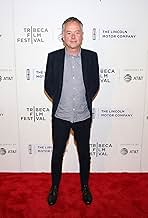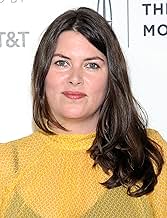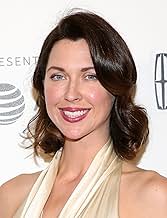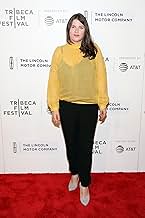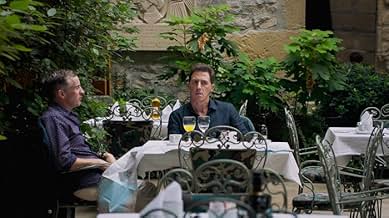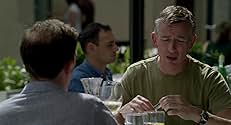IMDb RATING
6.6/10
6.6K
YOUR RATING
Actors Steve Coogan and Rob Brydon embark on a six-part episodic road trip through Europe. This time they're in Spain, sampling the restaurants, eateries, and sights along the way.Actors Steve Coogan and Rob Brydon embark on a six-part episodic road trip through Europe. This time they're in Spain, sampling the restaurants, eateries, and sights along the way.Actors Steve Coogan and Rob Brydon embark on a six-part episodic road trip through Europe. This time they're in Spain, sampling the restaurants, eateries, and sights along the way.
- Nominated for 1 BAFTA Award
- 1 win & 1 nomination total
Featured reviews
When I visited Spain for the first time many years ago, I immediately felt a sense of foreboding, as if I was being reminded of some long buried event, perhaps in another lifetime. Everything that happened during my stay there did nothing to dispel those feelings either and I have never gone back. Of course, I did not have the amenities available to English actors and comedians Steve Coogan ("The Dinner") and Rob Brydon ("The Huntsman: Winter's War") in Michael Winterbottom's ("On the Road") The Trip to Spain. Based on a TV series, it is the third in a series of "trip" films that follows the 2010 film "The Trip" (to Northern England), and the 2014 "The Trip to Italy." I wish I could say that the movie was a "trip" but, even though I did not experience any foreboding while watching it, I found it to be an essentially empty and only sporadically funny experience.
Master impressionists as well as stand-up comedians, actors and screenwriters, Coogan and Brydon drive through Spain from Santander to Malaga, avoiding the well known tourist spots to visit small town Spain, places such as Getaria, Axpe near Bilbao, Prejano, Sigüenza, Almagro, and Malaga that we never hear about. They eat exquisite looking food, visit historic sites, and, of course, provide a staggering ton of impressions including those of Michael Caine, Mick Jagger, Robert de Niro, Marlon Brando, Roger Moore and many others. It goes without saying that driving a Range Rover for a thousand miles, staying in expensive hotels and eating in posh restaurants is not an experience that is readily available to most people.
Of course, they are good comedians and some of the routines garner a lot of laughs, like the wordplay on the Moors and the family of Roger Moore, a sequence which is funny but unfortunately goes on too long. They also riff on James Bond movies, the Spanish Inquisition, and the character of Don Quixote which leads to their donning costumes and sitting on donkeys for a photo shoot. Playing fictionalized versions of themselves, the rationale for the trip is that Rob is going to write a series of restaurant reviews for The Observer and Steve is gathering notes for a book comparing his trip to Spain when he was younger with this new middle-aged one.
While both men are outward successes, the two remain basically insecure and their prickly banter often has a sharp edge to it. Though Steve adapted the Oscar-nominated film "Philomena" for the screen (a fact he is not hesitant to throw in Rob's face with sickening regularity), his agent has walked out and he is dismayed by the fact that the studio is bringing in a new writer to "polish" his script for a new film. Steve is in love with Mischa (Margo Stilley, "The Royals" TV series), who is now married, but she turns down his offer to visit him on his trip. Rob, though he recently appeared in a big-budget Hollywood movie, seems to have become reconciled to being a supporting actor but longs for a starring role. One revealing segment takes place when a young busker performing near a restaurant for gratuities is invited by Steve to have a drink with them.
Everything goes well until the musician starts recommending good places to visit in Spain which Steve finds threatening to his self image of being a man of the world and gets up and walks away from the table. While critics have found the repetitious format of the first two films to have become stale, not having seen the first two, I have no basis for comparison. For me, however, The Trip to Spain quickly became stale and tedious all on its own. The only music in the film is the lovely but overdone 1960s song, "The Windmills of Your Mind." In the land of Flamenco, however, we do not hear or see any, nor is there any more than a passing interest in the food being served.
The world travelers do not meet or talk to any Spaniards other than waiters, bell boys or old girlfriends. There is talk about dinosaurs and we get some history lessons but there is no mention of Goya, Garcia-Lorca, Juan-Ramon Jimenez, Gaudi, Casals, Segovia or the Prado. Spanish poet and mystic San Juan de la Cruz said, "In savoring the finite joy, the very most one can expect is to enfeeble and destroy our taste and leave the pallet wrecked." The film may showcase the Spain you will find in a National Geographic special, but it is Spain without its heart and its sou
Master impressionists as well as stand-up comedians, actors and screenwriters, Coogan and Brydon drive through Spain from Santander to Malaga, avoiding the well known tourist spots to visit small town Spain, places such as Getaria, Axpe near Bilbao, Prejano, Sigüenza, Almagro, and Malaga that we never hear about. They eat exquisite looking food, visit historic sites, and, of course, provide a staggering ton of impressions including those of Michael Caine, Mick Jagger, Robert de Niro, Marlon Brando, Roger Moore and many others. It goes without saying that driving a Range Rover for a thousand miles, staying in expensive hotels and eating in posh restaurants is not an experience that is readily available to most people.
Of course, they are good comedians and some of the routines garner a lot of laughs, like the wordplay on the Moors and the family of Roger Moore, a sequence which is funny but unfortunately goes on too long. They also riff on James Bond movies, the Spanish Inquisition, and the character of Don Quixote which leads to their donning costumes and sitting on donkeys for a photo shoot. Playing fictionalized versions of themselves, the rationale for the trip is that Rob is going to write a series of restaurant reviews for The Observer and Steve is gathering notes for a book comparing his trip to Spain when he was younger with this new middle-aged one.
While both men are outward successes, the two remain basically insecure and their prickly banter often has a sharp edge to it. Though Steve adapted the Oscar-nominated film "Philomena" for the screen (a fact he is not hesitant to throw in Rob's face with sickening regularity), his agent has walked out and he is dismayed by the fact that the studio is bringing in a new writer to "polish" his script for a new film. Steve is in love with Mischa (Margo Stilley, "The Royals" TV series), who is now married, but she turns down his offer to visit him on his trip. Rob, though he recently appeared in a big-budget Hollywood movie, seems to have become reconciled to being a supporting actor but longs for a starring role. One revealing segment takes place when a young busker performing near a restaurant for gratuities is invited by Steve to have a drink with them.
Everything goes well until the musician starts recommending good places to visit in Spain which Steve finds threatening to his self image of being a man of the world and gets up and walks away from the table. While critics have found the repetitious format of the first two films to have become stale, not having seen the first two, I have no basis for comparison. For me, however, The Trip to Spain quickly became stale and tedious all on its own. The only music in the film is the lovely but overdone 1960s song, "The Windmills of Your Mind." In the land of Flamenco, however, we do not hear or see any, nor is there any more than a passing interest in the food being served.
The world travelers do not meet or talk to any Spaniards other than waiters, bell boys or old girlfriends. There is talk about dinosaurs and we get some history lessons but there is no mention of Goya, Garcia-Lorca, Juan-Ramon Jimenez, Gaudi, Casals, Segovia or the Prado. Spanish poet and mystic San Juan de la Cruz said, "In savoring the finite joy, the very most one can expect is to enfeeble and destroy our taste and leave the pallet wrecked." The film may showcase the Spain you will find in a National Geographic special, but it is Spain without its heart and its sou
This is the third movie in a series of road trips by funny man Steve Coogan and his sidekick Rob Brydon. I still recall the second movie, "The Trip to Italy," which shares the same premise: two semi-famous British entertainers eat their way through a country while entertaining each other with scripted and improvisational banter and comedy. "The Trip to Spain" echoes the last movie except the scenes are in Spain and the language being spoken is Spanish.
It seems to me that there's a lot more involvement with people playing Coogan's and Brydon's families and love interests in this third movie and for me, this pierces the bubble of the movie's conceit. Coogan calls his married lover in New York and a camera just happens to be there to capture her end of the call? If that part isn't unscripted, then the whole movie is scripted with perhaps some improvisation. So when Coogan and Brydon entertain each other with endless facts about the towns they're visiting, they're not being erudite, they're reciting scripted lines. Some of the overlong imitations of Marlon Brando, Mick Jagger, Sean Connery, and particularly Roger Moore--those are likely to be improvisational.
In all, this is a pleasant movie and the Spanish scenery and architecture steal the show and are probably worth the price of admission alone. The bit about food and reviewing restaurants seems muted and subdued in this film compared to the last one.
The ending however, deserves to live on the cutting room floor. (Again, that's my opinion.) I'll leave it to you to decide on that one.
It seems to me that there's a lot more involvement with people playing Coogan's and Brydon's families and love interests in this third movie and for me, this pierces the bubble of the movie's conceit. Coogan calls his married lover in New York and a camera just happens to be there to capture her end of the call? If that part isn't unscripted, then the whole movie is scripted with perhaps some improvisation. So when Coogan and Brydon entertain each other with endless facts about the towns they're visiting, they're not being erudite, they're reciting scripted lines. Some of the overlong imitations of Marlon Brando, Mick Jagger, Sean Connery, and particularly Roger Moore--those are likely to be improvisational.
In all, this is a pleasant movie and the Spanish scenery and architecture steal the show and are probably worth the price of admission alone. The bit about food and reviewing restaurants seems muted and subdued in this film compared to the last one.
The ending however, deserves to live on the cutting room floor. (Again, that's my opinion.) I'll leave it to you to decide on that one.
Steve Coogan and Rob Brydon return as barely-fictionalized versions of themselves, once again on a tour to write articles about local cuisine. This time they're in Spain, but the focus remains on the dialogue and camaraderie between Coogan and Brydon, as they once again have dueling celebrity impressions of Roger Moore, Michael Caine, Mick Jagger and more. Also featuring Marta Barrio and Claire Keelan.
This follows 2010's The Trip and 2014's The Trip to Italy, and they are all virtually the same, with only the location changing: part travelogue, part haute cuisine foodie indulgence, but mainly witty, at times laugh-out-loud hilarious conversation between British film and TV stars Coogan and Brydon. The Spanish scenery is spectacular, and the many ancient buildings visited are a highlight. This one does end on a much different note than the others, and I'll be curious to see the fourth one "Trip To Greece". The formula still hasn't gotten old for me, and I'd be willing to watch more of these from all over the globe.
This follows 2010's The Trip and 2014's The Trip to Italy, and they are all virtually the same, with only the location changing: part travelogue, part haute cuisine foodie indulgence, but mainly witty, at times laugh-out-loud hilarious conversation between British film and TV stars Coogan and Brydon. The Spanish scenery is spectacular, and the many ancient buildings visited are a highlight. This one does end on a much different note than the others, and I'll be curious to see the fourth one "Trip To Greece". The formula still hasn't gotten old for me, and I'd be willing to watch more of these from all over the globe.
I liked the two previous Trip movies, but they had something more than two comedians riffing off each other in exotic locations, they had some personal connection. While Trip to Spain uses the exact same formula, it lacks anything that makes me relate to the characters. It shows them having midlife drama with agents leaving or chasing them, but that's about their job, not their life. And the additional one with the son of Coogan feels artificial, as it doesn't really affect the overall story. What I would have liked was to see the relationship between the two characters evolve, but in fact it stays exactly the same.
The depiction of Spain is even more sketchy than in the other two movies, which is saying something and they are over 50. Instead of glamorous actors that seduce women in European tourist traps, they turn into the two old Muppets!
I hope there is some evolution in the next film, if there will be any, because even the jokes were duplicated from previous movies.
The depiction of Spain is even more sketchy than in the other two movies, which is saying something and they are over 50. Instead of glamorous actors that seduce women in European tourist traps, they turn into the two old Muppets!
I hope there is some evolution in the next film, if there will be any, because even the jokes were duplicated from previous movies.
As is the case with the previously released trips ('The Trip', 2010 and 'The Trip to Italy', 2014) with Steve Coogan and Rob Brydon, so it is with 'The Trip to Spain' that it does not really play out as a film but rather an extended TV show. Which it is. Although actually shortened and combined from the six episodes of the last (third) series.
What kind of show exactly is 'The Trip' itself, is quite difficult to determine because although the trips are partly to do with reviewing food, a minuscule amount of comments made on the subject actually reach the viewer. Same is with visiting different locations, though at least in that aspect there are small bits of useful information pointed out every now and again. Though it's hardly ever an extensive introduction to the place visited. It's not a documentary even though it might come across as such. Calling it a talk show wouldn't be quite right either. In a way it is a different version of 'Top Gear' with just as beautiful camera work but less information and unfortunately - as it is listed under comedy - jokes.
Steve and Rob get on with their usual antics which obviously include a lot of impressions, but it gets old at some point and I truly don't want the hear either of them say: "I told you to blow the bloody doors off" and then try to settle on the age of the voice etc. It's the constant competition between the two who's better at impressions which includes mimicking mainly just one sentence over and over and over and over and over and over again. Which brings me the horrific flashbacks from watching 'Dude Where's My Car' as a teen and not being amused. However, I can respect, accept and enjoy repetition (British comic Stuart Lee is a great example), but it has to serve a purpose. At the moment were not watching a film, ahem, TV show. We're watching to guys rehearsing for it. Despite that I'm not calling the show unfunny. No, far from it. 'The Trip to Spain' is still humorous. Just not necessarily laughing out loud funny. It has it's better moments though.
So basically, if you've enjoyed the previous films or TV series, you can probably appreciate this one as well, if not, then there's nothing that will convince you otherwise. It has its entertainment value but not for everyone. If I had enough money to go out for even one meal like in the film with a friend, I would've done that instead and had much more fun. But on the other hand perhaps wouldn't have learned all I know about the invasion of Spain by Roger Moors.
What kind of show exactly is 'The Trip' itself, is quite difficult to determine because although the trips are partly to do with reviewing food, a minuscule amount of comments made on the subject actually reach the viewer. Same is with visiting different locations, though at least in that aspect there are small bits of useful information pointed out every now and again. Though it's hardly ever an extensive introduction to the place visited. It's not a documentary even though it might come across as such. Calling it a talk show wouldn't be quite right either. In a way it is a different version of 'Top Gear' with just as beautiful camera work but less information and unfortunately - as it is listed under comedy - jokes.
Steve and Rob get on with their usual antics which obviously include a lot of impressions, but it gets old at some point and I truly don't want the hear either of them say: "I told you to blow the bloody doors off" and then try to settle on the age of the voice etc. It's the constant competition between the two who's better at impressions which includes mimicking mainly just one sentence over and over and over and over and over and over again. Which brings me the horrific flashbacks from watching 'Dude Where's My Car' as a teen and not being amused. However, I can respect, accept and enjoy repetition (British comic Stuart Lee is a great example), but it has to serve a purpose. At the moment were not watching a film, ahem, TV show. We're watching to guys rehearsing for it. Despite that I'm not calling the show unfunny. No, far from it. 'The Trip to Spain' is still humorous. Just not necessarily laughing out loud funny. It has it's better moments though.
So basically, if you've enjoyed the previous films or TV series, you can probably appreciate this one as well, if not, then there's nothing that will convince you otherwise. It has its entertainment value but not for everyone. If I had enough money to go out for even one meal like in the film with a friend, I would've done that instead and had much more fun. But on the other hand perhaps wouldn't have learned all I know about the invasion of Spain by Roger Moors.
Did you know
- TriviaSteve Coogan and Rob Brydon talk about the song "The Windmills of Your Mind" sung by Noel Harrison and it is played at the film's ending. A different version of this song by The King's Singers was played at the end of the final episode of Coogan's TV show, Alan Wide Shut (2002), where Alan goes to see the unsold copies of his autobiography being pulped.
- GoofsSteve says while at lunch that a version of 12 Years a Slave was made by HBO "about ten years ago". No such version exists but PBS did make a version in 1984 entitled Solomon Northup's Odyssey.
- ConnectionsEdited from The Trip (2010)
- SoundtracksThe Windmills of your Mind
Music by Michel Legrand
Lyrics by Alan Bergman and Marilyn Bergman
Performed by Noel Harrison
- How long is The Trip to Spain?Powered by Alexa
Details
- Release date
- Country of origin
- Official site
- Languages
- Also known as
- 享受吧!瘋味西班牙
- Filming locations
- Spain(on location)
- Production company
- See more company credits at IMDbPro
Box office
- Gross US & Canada
- $1,157,604
- Opening weekend US & Canada
- $40,875
- Aug 13, 2017
- Gross worldwide
- $1,988,841
- Runtime1 hour 48 minutes
- Color
- Aspect ratio
- 1.85 : 1
Contribute to this page
Suggest an edit or add missing content



